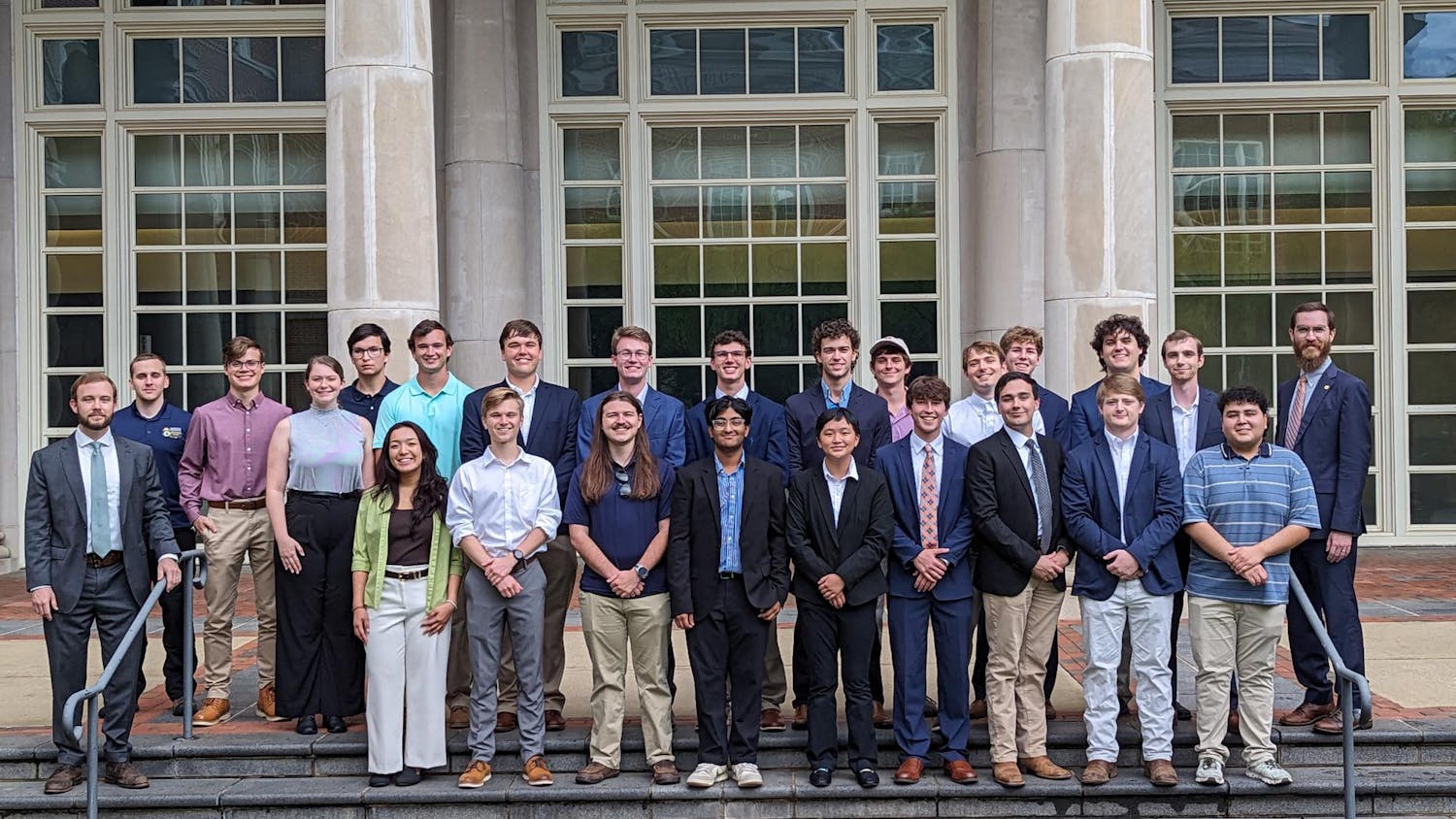Editor’s Note: This story contains explicit language and descriptions of sexual harassment.
Richard Hansen, dean of Auburn University's Harrison School of Pharmacy, was found responsible for a violation of Auburn’s Policy Against Discrimination and Harassment after sexually harassing a student at an off-campus bar last spring, according to documents received by The Plainsman.
The student, who is enrolled at Auburn University but not the pharmacy school, reported Hansen to Auburn University's Title IX Office in late September, which conducted an investigation into Hansen's behavior.
According to Title IX’s final investigative report, Hansen told her that she was “going to suck his dick, gag, and keep her head down.”
“We find Hansen’s conduct toward [the student] to be severe,” the report reads. “We find Hansen’s conduct created an intimidating, hostile or offensive University environment.”
On Jan. 26, after the investigation had concluded, Title IX informed the student via an email viewed by The Plainsman that Hansen would “have a one-month suspension and other appropriate sanctions.”
However, on Feb. 9, Title IX informed the student via email that they had “mistakenly provided inaccurate information regarding sanctions to be imposed on Dean Hansen.” Neither Title IX nor the provost's office shared details of the corrective action taken to The Plainsman or to the student.
Hansen is still working in his position as dean, a position he has had since 2017.
April 25
“There was one day I was the only employee in the building, which was normal for Sundays,” the student said in an interview with The Plainsman, in reference to April 25, 2021. “And I had a group of guys, and they were like my regulars. They were in there. They're super nice. And then him and one of his friends were down at the end — other end of the bar.”
According to the student, Hansen’s friend Jason Peevy left the bar before Hansen began making inappropriate comments toward her.
According to the final investigative report, Peevy told investigators that while he did not hear Hansen make sexual comments towards the student, Hansen “gauged [the student’s] interest in him (Hansen), but [the student] was not inviting Hansen’s advances."
“He was talking about wanting to take me home and me giving him and the other guy a blowjob,” the student said. “He went very graphic into that stuff.
“That’s when … I was like, ‘Okay, that’s harassment.’ The other stuff was like, ‘That’s disgusting.’”
The student knew that Hansen was a dean, and she said he knew who she was.
“[Hansen] would ask me about school, told me he saw me on campus a couple times,” she said. “I mean, I immediately was very stern and like, ‘You’re not going to talk to me like that,’ …and I walked away. And he actually fell asleep at the bar after two-and-a-half beers.”
She called her manager and told her what was going on before calling the general manager.
“[The general manager] basically told me to get [Hansen] out of there, so I called some other people and ended up having one of his friends come back and get him,” the student said. “And then, I guess they didn’t really do anything other than [tell] me they were going to have a conversation with him. Within two weeks, he was still doing his normal stuff.”
According to the student, Hansen would sit at the bar while she was there, which she thought would not have been allowed.
“When I stopped working there, I didn’t have a fear of losing my job anymore,” she said. “I was like, ‘Okay, I graduate in the spring. He probably can’t prevent me from graduating at this point. Let’s just go ahead and report it because this is getting out of hand.’”
Since Hansen harassed her on April 25, she said she isolated herself. She lost almost 30 pounds in only a few weeks.
On Oct. 1, a no-contact directive had been issued at the student’s request by the Title IX office, barring Hansen and the student from any means of communication. Any violation of the directive could result in corrective action.
On New Year’s Eve, he showed up at a bar she was closing with her friend.
“He came in and he sat down across from me,” she said. “My friend started asking me, ‘Why is that guy staring at you?’ So I had to report that, and of course he denied it and whatnot.”
The student said Hansen sat down, stared at her then left without buying a drink. Following this encounter, she said she became more paranoid about being followed.
After Hansen sexually harassed her, the student began avoiding places on campus that were close to the pharmacy school. She stopped going to her classes in Lowder Hall.
"The difference in power between us is the reason I didn’t come forward sooner," she said in a written opposition to his appeal. "I wasn’t even sure I’d be heard if I did speak up and the power dynamic is the reason I feel so uncomfortable on campus."
This, along with her avoidance of Lowder Hall, was evidence Title IX used in their final investigative report to claim that Hansen’s actions “created an intimidating and offensive University environment for [the student].”
When she was deciding whether or not to report Hansen, the student weighed the risks. She was not sure if he would be able to kick her out of the University or what the University would be able to do for her.
“There was so much going through my mind,” she said. “Then I was like, ‘These other girls that he definitely — he’s definitely doing stuff to other girls. And me not speaking up, that definitely didn’t sit right with me.”
Title IX
After reporting the incident to Title IX on Sept. 27, the student was quickly put in contact with the office. Within a month, the investigation was completed and the student was given the final investigation report.
Hansen appealed the ruling on Nov. 3, saying the complaint falls outside the purview of Auburn’s Policy Against Discrimination and Harassment and that Hansen’s conduct was not “objectively severe” and did not create an “intimidating, hostile or offensive University environment.” His appeal was denied.
“Hansen did not outright deny [the student’s] allegations,” the final investigation report said. “In fact, he stated he has no recollection of making the comments and making such comments are ‘uncharacteristic’ of him.”
Hansen claimed to be unable to recall other aspects of the evening of April 25, but testimony from the student and Peevy confirm them, investigators concluded.
“[Hansen] stated he did not remember any conversations being directed toward [the student]; however, Peevy stated the opposite,” the report said. “Hansen stated he does not believe he fell asleep at the bar that evening; however, [the student] stated Hansen fell asleep, Peevy stated someone called him and relayed that Hansen was asleep, and there is a photo of Hansen asleep.”
After the student was informed in January that Hansen would be suspended for a month, she thought it was over.
“I was like, ‘This is great. He’s being held accountable. At least something is being done,'” she said.
Despite this, she said she still felt the suspension was “a little bit of a slap on the wrist.” She was not told whether the suspension would be paid or unpaid, though she was later told he would not be suspended at all.
After receiving the email claiming Hansen would face a one-month suspension, the student asked Title IX if she could receive all of the related paperwork.
“And that was just ignored,” she said. “I asked [Katherine Weathers, senior deputy Title IX coordinator] why that was ignored, and she said she wasn’t sure and then assured me that they had been very timely on getting back to me about everything.”
The student said she had been revoked access to the Title IX documentation she was previously given via Box, an online file-sharing service, about the same time her friend reached out on her behalf to The Plainsman.
In a meeting with Title IX following the Feb. 9 email, which clarified that Hansen would not be suspended and that his corrective action would not be shared, the student said she was told that she would be allowed to come view the documents, but she could only get copies of the documents through a court-issued subpoena.
Differentiating Title IX
Auburn’s full Title IX policy only applies to sexual harassment that “occurs within the University’s Education Programs and Activities in the U.S.” In cases where sexual harassment between two University-affiliated individuals occurs off-campus — or on study abroad trips — the University employs its Policy Against Discrimination and Harassment instead.
Since this case was handled under the Policy Against Discrimination and Harassment instead of the Title IX Sexual Harassment Policy, there was no hearing, where a hearing officer brings the parties together to deliberate the evidence and determine any discipline to be imposed if one is determined responsible for violating this policy.
According to the Title IX Sexual Harassment Policy, the hearing officer is required to transmit a written decision to the parties following the hearing, which would include the discipline deemed appropriate for the violator of the policy. The Policy Against Discrimination and Harassment, on the other hand, does not require Title IX to notify the complainant of the discipline given.
In a meeting with Title IX, the student said she was told she would only be notified if the corrective action resulted in suspension or termination of employment.
Additionally, when faculty are found in violation of this policy, corrective action is determined by Kelley Taylor, the director of the office of affirmative action and equal employment opportunity, in consultation with Emmett Winn, associate provost of faculty affairs, “and/or the respective Dean, and/or Chair,” the policy states.
In the Title IX Sexual Harassment Policy, corrective action is determined by the hearing officer instead.
If Hansen had sexually harassed the student on campus, she would have been given access to documents related to corrective action taken against him, per the Title IX policy. Since she was harassed off campus, however, the University has no obligation to share corrective action taken under the Policy Against Discrimination and Harassment.
Winn declined to comment for this story.
Jim Ward, counsel for the Alabama State Board of Pharmacy, said "the Board is aware of the situation involving the Dean and is looking into the matter."
When The Plainsman reached out to Hansen regarding the details of his suspension, he informed The Plainsman that he was, in fact, not being suspended and directed further questions to the Office of the General Counsel. He has not responded to further requests for comment for this story.
Listed below are resources for survivors of sexual assault or harassment:
Safe Harbor: 334-844-7233 or safeharbor@auburn.edu
Rape Counselors of East Alabama: 334-705-0510
Student Counseling and Psychological Services: 334-844-5123
National Sexual Assault Hotline: 1-800-656-4673
Do you like this story? The Plainsman doesn't accept money from tuition or student fees, and we don't charge a subscription fee. But you can donate to support The Plainsman.

Trice Brown, senior in english language arts education, is the multimedia editor of The Auburn Plainsman.

My Ly, junior in journalism, is the news editor of The Plainsman.





